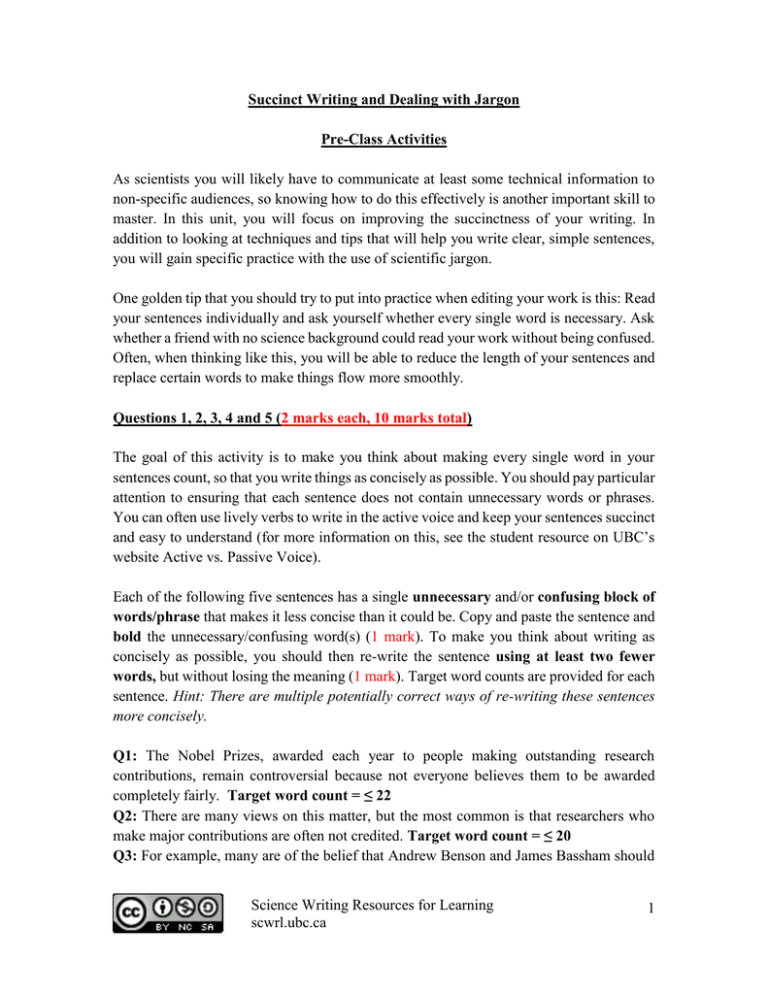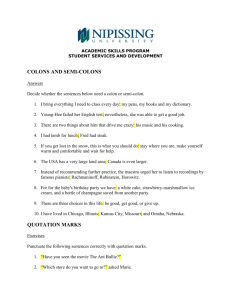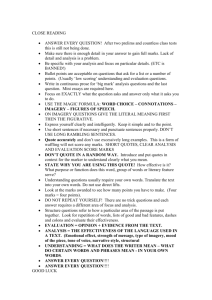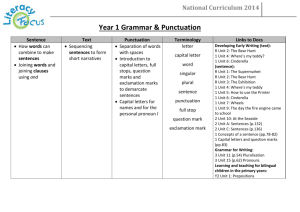Version 3
advertisement

Succinct Writing and Dealing with Jargon Pre-Class Activities As scientists you will likely have to communicate at least some technical information to non-specific audiences, so knowing how to do this effectively is another important skill to master. In this unit, you will focus on improving the succinctness of your writing. In addition to looking at techniques and tips that will help you write clear, simple sentences, you will gain specific practice with the use of scientific jargon. One golden tip that you should try to put into practice when editing your work is this: Read your sentences individually and ask yourself whether every single word is necessary. Ask whether a friend with no science background could read your work without being confused. Often, when thinking like this, you will be able to reduce the length of your sentences and replace certain words to make things flow more smoothly. Questions 1, 2, 3, 4 and 5 (2 marks each, 10 marks total) The goal of this activity is to make you think about making every single word in your sentences count, so that you write things as concisely as possible. You should pay particular attention to ensuring that each sentence does not contain unnecessary words or phrases. You can often use lively verbs to write in the active voice and keep your sentences succinct and easy to understand (for more information on this, see the student resource on UBC’s website Active vs. Passive Voice). Each of the following five sentences has a single unnecessary and/or confusing block of words/phrase that makes it less concise than it could be. Copy and paste the sentence and bold the unnecessary/confusing word(s) (1 mark). To make you think about writing as concisely as possible, you should then re-write the sentence using at least two fewer words, but without losing the meaning (1 mark). Target word counts are provided for each sentence. Hint: There are multiple potentially correct ways of re-writing these sentences more concisely. Q1: The Nobel Prizes, awarded each year to people making outstanding research contributions, remain controversial because not everyone believes them to be awarded completely fairly. Target word count = ≤ 22 Q2: There are many views on this matter, but the most common is that researchers who make major contributions are often not credited. Target word count = ≤ 20 Q3: For example, many are of the belief that Andrew Benson and James Bassham should Science Writing Resources for Learning scwrl.ubc.ca 1 have been credited for their work on carbon assimilation in plants, along with Melvin Calvin, who was the sole recipient in 1961. Target word count = ≤ 34 Q4: The 'Calvin cycle' helped us shed light on the cellular processes of plants. Target word count = ≤ 11 Q5: In essence, Benson and Bassham's work was also very important in helping us understand these processes. Target word count = ≤ 14 The Importance of Using Simple Words One of the greatest misconceptions in writing is the idea that you need to use intellectualsounding words to give your work a sense of power. Your only goal should be to write something that is easily understood by whoever reads it. The best way of achieving this is to write short sentences containing words used frequently by everybody. So, instead of ‘elucidating a concept to change the views of your myopic readers’, why not just ‘explain the concept to change the views of the short-sighted readers?’ Similarly, why tell your audience that your invention will have ‘universal applications across the globe’ when they already know that ‘universal’ means that something will apply to every situation? The goal of the questions in this section is to make sure you do not over-complicate your writing with needlessly fancy words, and give you some practice in spotting redundant qualifiers in your writing (e.g. 'totally unique'). Questions 6 and 7 (1 mark each, 2 marks total) Try to spot the unnecessary words/redundant qualifiers in the following two sentences (questions). Copy and paste the sentences and bold the one unnecessary word/redundant qualifier in each case (1 mark). Q6: It is absolutely vital that researchers do not know which group of subjects receives the drug in medical trials. Q7: If they did know, sceptics could then question the final outcome of such experiments. Questions 8 and 9 (4 marks each, 8 marks total) In each of the following two questions there are two errors. These might be overly fancy words and/or unnecessary words/redundant qualifiers. Copy and paste the sentences and bold the two errors (2 marks). Then re-write the sentences appropriately; this will involve Science Writing Resources for Learning scwrl.ubc.ca 2 omitting unnecessary words/redundant qualifiers and providing an alternative, simpler version for overly fancy words (2 marks). Q8: Studies have shown that people are reticent to trust many drug trials for other, additional reasons. Q9: Another is that people are oftentimes unconvinced by trials that utilize small sample sizes of people. Eliminating Ambiguous Words The goal of this activity is to highlight how important it is to eliminate ambiguous (unclear) words from your writing. A word (or phrase) might be ambiguous for one of three main reasons: 1: It might be jargon used in an inappropriate setting. For example, it might only make sense to someone with specialist knowledge in that field of expertise (e.g. ‘Group A salmon grew significantly more than Group B salmon’ would mean different things to scientists and non-specialist audiences with no knowledge of statistics). 2: It might use an adjective that could cause different readers to interpret the meaning of your sentence differently (e.g. ‘Group A salmon grew frighteningly quickly’ could mean they grew much more quickly than expected, or that you were scared by their speed of growth). 3: It might contain overly long strings of adjectives and nouns (e.g. It is hard to read: ‘Group A salmon featured aggressive dominant voracious-feeding Type II males’). Questions 10 and 11 (2 marks each, 4 marks total) In each of the following two questions, there are two ambiguity-related errors that can be improved. Copy and paste the sentences and bold the two ambiguous words (2 marks). Q10: Such a devastating discovery could go unreported in the press if the gravity of its application is not clearly explained. Q11: Despite this, the trend for energy conversion is impressively different between the mice fed different diets in this experiment. Questions 12 and 13 (2 marks each, 4 marks total) Science Writing Resources for Learning scwrl.ubc.ca 3 In each of the following two questions, there are two ambiguity-related errors that can be improved. In these questions, these errors are already bolded for you. Copy and paste the sentences and re-write them to remove the ambiguity (2 marks). Hint: There are multiple potentially correct ways of re-writing these sentences to remove ambiguity. Q12: When writing about science and/or research, even seasoned professionals sometimes use language that is too pedestrian to engage their audience. Q13: However, it can also be ridiculously tempting to exaggerate when trying to illuminate the best parts of your work. Question 14 (5 marks) Choose one of the two journal articles below (the links to these can be accessed by clicking on each article title below, but you can also find them yourself by using a specialist search engine, such as Google scholar). You may need to log in to the UBC library when prompted, by using your CWL to access these articles (note that if you try to download from home you will have to set up VPN). Alternatively, you can access them yourself using the UBC library search function; typing in the article title alone (bolded below) will bring up an E-link. 1: Avoidance of feeding opportunities by the whelk Buccinanops globulosum in the presence of damaged conspecifics. (2012) http://link.springer.com/article/10.1007%2Fs00227-012-2020-8 2: “The Words of Things Entangle and Confuse”: The Ambiguous Political Concept). (1982) http://www.jstor.org/discover/10.2307/1601024?uid=3738232&uid=2129&uid=2&uid=7 0&uid=4&sid=21104456075587 Read the abstract carefully and try to put the contents into your own words in a way that makes the sentences more concise (2 marks), easier to read (1 mark), and less jargon-heavy (1 mark) in 75-150 words (1 mark). *** Bring your summary to class for the in-class activity session because you will use it to work with a partner in a peer-review exercise. *** Science Writing Resources for Learning scwrl.ubc.ca 4 Science Writing Resources for Learning scwrl.ubc.ca 5






